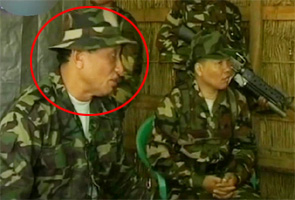By Samudra Gupta Kashyap
 Last week, a major supermarket chain of the country ran foul of the All Assam Students’ Union (AASU) for apparently trying to resist its extortion demands.
Last week, a major supermarket chain of the country ran foul of the All Assam Students’ Union (AASU) for apparently trying to resist its extortion demands.
Knowing which way the wind was blowing, the supermarket chain thought better than resisting AASU, and later apologised to the student body.
The episode was yet another instance of business houses yielding to strong-arm tactics used by outfits in the Northeast India to extort “donations” from private parties.
These can range from student bodies and literary organisations to puja and bihu committees, apart from political parties. The other, more dangerous, “donation” seekers are armed underground groups:
MANIPUR: The worst hit, the state is known for the highest number of underground outfits in the country.
While the NSCN(IM), whose general secretary hails from Ukhrul district in Manipur, allegedly collects anywhere between Rs 20 and 30 crore from Manipur, all other groups also heavily depend upon extortion to run their organisations.
Thus “tax” is imposed on traders, transporters, suppliers, contractors and government as well as private employees, hospitals and educational institutions. Conservative estimates put the total sum drained away through extortions at about Rs 100 crore per year.
NAGALAND: It has two major NSCN factions currently in ceasefire mode, and reports of extortions are a regular affair. There have been reports of government employees paying “tax” in fixed percentages based on their pay scale.
Though not many statistics are available as most extortion cases go unreported, with traders and individuals preferring to pay up rather than invite trouble, the police in Dimapur — Nagaland’s trade hub — did register as many as 162 extortion cases in 2009, mostly filed by truck drivers and transport operators.
“Tax” imposed on trucks carrying onions amounts to Rs 8,000 to Rs 9,000, those carrying steel pay Rs 12,000, and those carrying medicines up to Rs 25,000.
ASSAM: Though the ULFA is currently at its all-time low (chairman Arabinda Rajkhowa and most top leaders are in jail), the outfit is said to be still collecting about Rs 10 crore a month, mostly from tea companies, traders and contractors.
Similarly, though the National Democratic Front of Bodoland (NDFB) has split and its founder chairman Ranjan Daimary is in jail, its cadres continue to extort money in several districts, including in Guwahati. In the Dima Hasao (erstwhile North Cachar Hills) district, where several hundred crores of rupees of developmental funds has been siphoned off by a nexus of militants, bureaucrats, suppliers and politicians, it was only last week that government doctors received a “tax” notice from the NSCN(IM).
MEGHALAYA: The state too has a huge problem of extortion, though insurgency here is not as big as in Assam or Manipur.
Several underground groups collect money in crores of rupees from traders, particularly those into coal mining.
In September, a district transport officer in Garo Hills was kidnapped after he failed to respond to a notice for Rs 50 lakh from Garo National Liberation Army.
OTHER STATES: While extortion is not a major headache in Mizoram and Tripura, people in certain districts in Arunachal Pradesh are feeling the heat.
Both factions of the NSCN put together allegedly collect about Rs 2 crore a month from traders, contractors and suppliers in Tirap and Changlang districts.
Recently the state home minister alerted businessmen and traders in Itanagar and Naharlagun (the adjoining trade hub) of NDFB cadres launching a major extortion drive.














